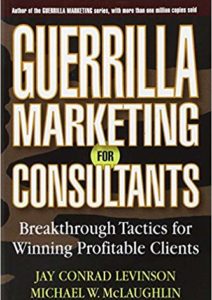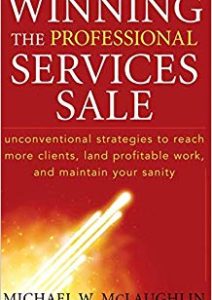“We liked your proposal, but…”
Lose the Sale…
Those five words said it all. The client proposal that I’d worked on tirelessly for weeks wasn’t good enough to close the sale.
Once I heard, “we’re going with another company,” it was tough to hear anything else. When a client call starts like that, you’d probably rather endure a multi-hour delay in a crowded airport than listen to the rest.
My initial thought about the bad news was predictable: The client was making a mistake. Obviously, I couldn’t voice that thought, so I tried to turn the decision around through a series of questions and clarifying comments.
That effort went nowhere. I lose the sale for sure.
But even when the client’s decision to use another company is final, there’s a wealth of market intelligence buried in that decision that’s too valuable to leave unearthed.
To improve your odds of winning in the future–with that client or any other–figure out the meaning of the signal the client is sending you.
Why Guess?
Your first reaction will probably be to assume you know why a sale went to someone else. You might be wrong, though. Maybe you lost because the client hired the CEO’s nephew, not because your proposal was considered inferior.
The only way to find out what you need to know is to ask the right questions. Most clients recognize (and appreciate) the effort and energy you put into your proposal and are willing to help.
What’s the Client’s Perception?
In some cases, clients have largely decided on their selection before the sales process gets underway. The favored company must only put forth a good effort to land the project. What can you do when the game is rigged? Move on.
If a competing company doesn’t have such an advantage, a loss is usually the result of a gap between what clients think they need and their perception of your ability to meet that need. Your aim should be to understand the root cause of that gap and close it next time.
During the sales process, the client’s perception of your offer is mainly about two factors: Your understanding of the situation the client is facing, and your proposed approach. Assuming you didn’t lose the project due to failed chemistry with one or more client decision makers (a common occurrence, by the way), you can trace most losses to one or both of these factors.
Your ability to deliver value the way the client wants depends on your grasp of the client’s objectives. Even slightly misinterpreting something in the client’s environment can leave you with a flawed (aka losing) approach.
Granted, most sellers do confirm their understanding of a project before devising an approach. But it’s easy to get other things wrong, like the scope of the work, the schedule, or your assumptions about how the work will be completed.
What Did You Miss?
For that reason, begin your debriefing by discussing your assumptions about the project. Test every facet of what you know, including project objectives, scope, and schedule.
You may discover weaknesses in your fact gathering that you can strengthen for future opportunities. Or, you may learn that you correctly diagnosed the problem, but some element in your proposed project approach was off.
Move on to a review of that approach, which includes your team, work plan, project organization, schedule, and tools. If you learn of gaps in your understanding of the project, the implications will quickly reveal themselves in your approach. It’s easy, for example, to overestimate the effort and expense of a project if the definition of the scope isn’t quite right.
Once you’ve got an understanding of why you lost, ask the crucial question, “What did the winning company do to make you choose them?” Be sure to listen carefully because, in that answer, you’ll hear exactly why you weren’t hired.
It’s possible that your competitor took the win because of capabilities, people, products, or processes that you couldn’t compete with. In my loss, for example, the client wanted, among other things, to work with a specific person in my competitor’s company.
What About Price?
For some clients, choosing a winner is all about price, even if a better alternative is available. But some clients select companies based on price because there’s no other discernible difference between the competitors. That’s a misconception you can correct.
If a client explains the loss by saying “the fee was too high for our budget,” it may not really be a budgetary issue. Instead, the client may believe that the presumed value-to-fee ratio wasn’t compelling enough to explore options for boosting the budget.
Price is an important consideration in every selection process. But a high-priced competitor can win if the client’s perception of value justifies the fee. Again, remember that the client’s perception of your value will be based on both your demonstrated understanding of the project and your intended approach.
Will You Get Straight Answers?
Maybe.
You and the client may both be uncomfortable sitting through a discussion of why the client chose one company over another. Some clients will sidestep the issues and get the meeting over with as soon as possible; others will go into more depth.
In either case, you’re only looking for one or two areas to work on. So it’s worth the investment of time, even if some clients are reluctant to talk.
When a client says “no,” you’ll experience an immediate letdown. After all, most sellers pursue projects they believe are winnable. When you expend the time and effort to propose on a project, the last thing you want is for a competitor to win the work.
But you can turn that around for the future by eliminating guesswork and getting the story straight from the client, not your imagination.
What you imagine is probably much worse than the truth.












